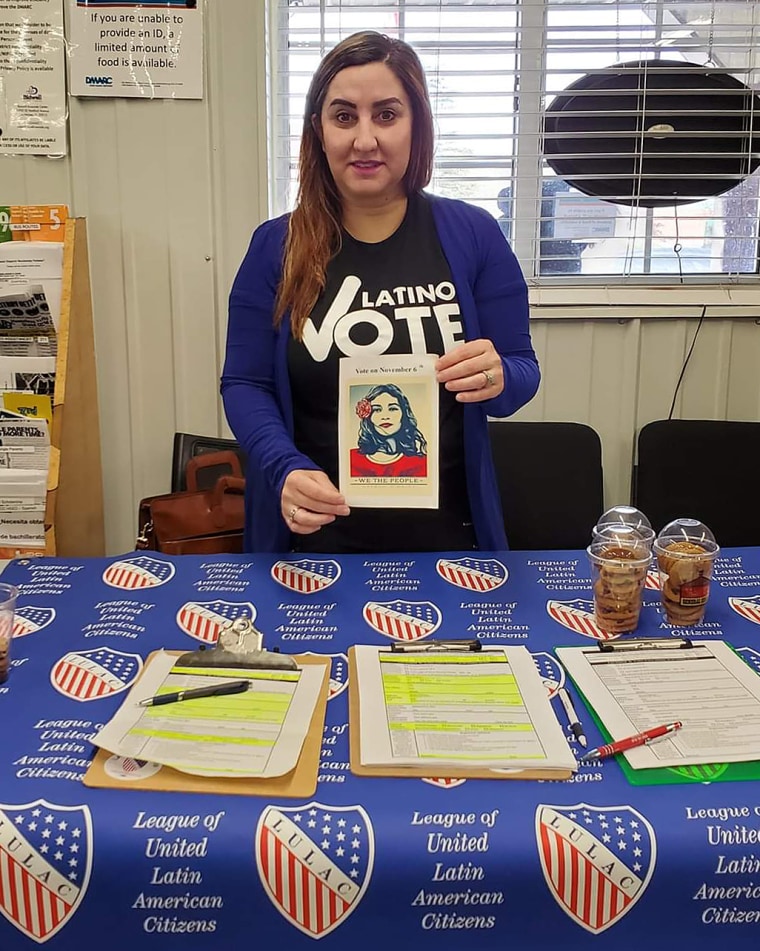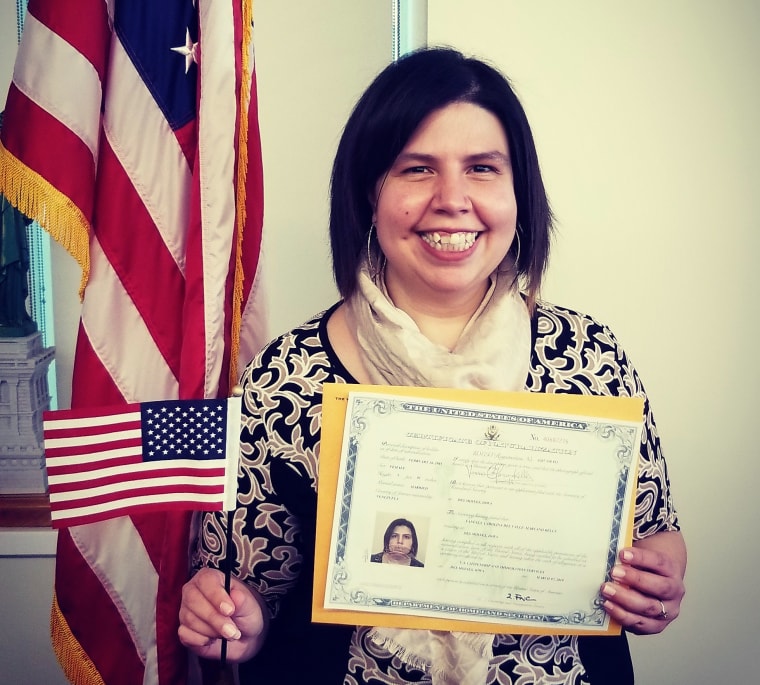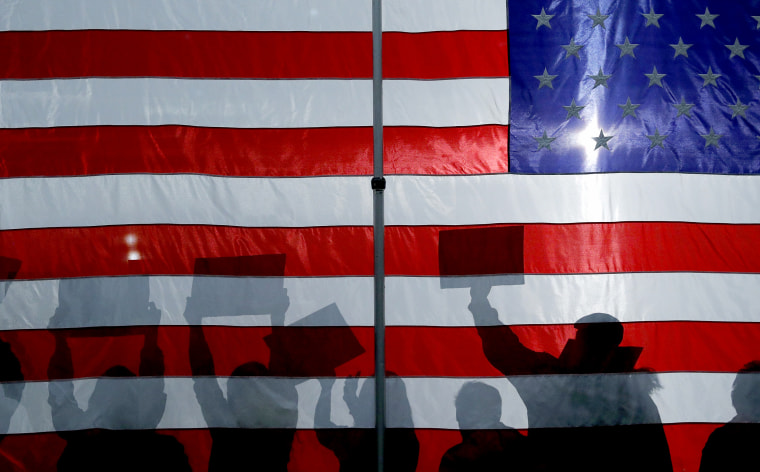When she invites other Iowa Latinos to caucus, Nataly Espinoza-Lara, 34, describes the political event as a “junta comunitaria", a community meeting.
There isn't a word in Spanish for caucus. Others trying to attract Latinos to the caucuses rely on the English word, but say it with a Spanish pronunciation — cow-koos.
Espinoza-Lara and others are trying to come as close as possible with words that best capture the political ritual because for the first time, bilingual English-Spanish satellite caucuses are being held in Iowa on Monday.
Their hope is that promoting and providing a caucus conducted mostly in Spanish will drive up interest and encourage more Latinos to take part in the kickoff of the Democrats' presidential nominating process, generally attended by mostly white Iowans.
“I can invite so many people,” said Espinoza-Lara, 34, who is bilingual and will caucus for the first time since becoming a U.S. citizen on Dec. 6. “I’m excited to bring my friends and my family that just became citizens too.”

The Iowa Democratic Party approved 87 satellite caucuses, 11 of which are "accommodating language and culture needs," and providing translation services at various sites.
Latinos make up 6 percent of the Iowa population and were 3.4 percent of eligible voters in 2018. They hold fewer than 30 local elective offices but no statewide or state legislative offices.
Yet, the community is growing; Latino children are enrolled in all 330 public school districts in the state except one, according to the Latino Political Network.
Almost a quarter of Iowa's adult Latino U.S. citizens — meaning they are eligible voters — are foreign born, about the same share for the nation as a whole, according to an analysis of Census data by Mark Hugo Lopez, director of global migration and demography research at Pew Research Center. Of all Latinos in Iowa who are 18 and under, just 5 percent are foreign born.
Rob Barron, who organized the Latino Political Network, said he likes to point out the public school enrollment, even if only a few Latino students are in a district, "because it shows the community is no longer solely concentrated in a couple of towns."
Although Des Moines has the most Latinos, there are many small towns in Iowa that are predominantly Hispanic and "wouldn't be in existence if it weren't for Latinos," he said.
Barron said the bilingual satellite caucuses are a good thing and similar to the party making sure caucuses are accessible to people with disabilities. "If you are going to have a contest to determine the next leader of the free world, you want to make it as accessible to people as possible," he said.
Mobilizing a growing community
In the last presidential election, the League of United Latin American Citizens recognized the lack of Latino officeholders and Latino political influence in the state. Local LULAC officials knocked on doors and held practice caucuses to increase Latino participation for 2016, spending about $250,000 that year.
According to LULAC, 1 of every 8 caucus goers in 2016 was Latino. The group has since focused on voter registration, adding 10,000 new Latino voters, and said about 70 percent of Latinos in the state are registered. It has spent about $100,000 this year.
Domingo Garcia, president of LULAC, said he expects 1 of every 4 caucus goers this election to be Latino in the 15 counties with the highest Latino populations and where about 77 percent of the registered Latino voters reside.
The group said it registered 10,000 new Latino voters for this election, which they hope will push the registered Latino voter total to about 60,000 or more.
If even half of total Latino registered voters turn out for the caucus “that could have a dramatic impact on the Democratic primary,” Garcia said.
The group also created some buzz about the 2020 Democratic primary and Latino voters with a town hall held in Iowa.
LULAC has about the same amount of money available for the work this year as in 2016. Before the group launched its voter registration effort it sued the state to stop a voter ID law that included other provisions the group saw as attempts to suppress the Latino vote. ID requirements in the law remain in place and other provisions were struck down.
Sanders' strong outreach to Latinos
Garcia and others said the campaign of Sen. Bernie Sanders, I-Vt., has had a large ground game going in Iowa’s Latino communities. Sanders did well with younger Latino voters in 2016 and is building on that, getting a boost from the endorsement of Rep. Alexandria Ocasio-Cortez, D-N.Y., who has been drawing crowds across the state as a surrogate for him.
Espinoza-Lara said she learned about caucusing from a friend who is working with the Sanders campaign.
Sen. Elizabeth Warren, D-Mass., former Vice President Joe Biden and the billionaire activist Tom Steyer also have been putting resources into turning out Latinos, Garcia said. Warren has been helped by former presidential candidate Julián Castro, who immediately went to work campaigning for Warren after dropping out of the race
Chuck Rocha, Sanders' senior political adviser, said the campaign "started talking to Latinos in Iowa before we started talking to white people" and has had field workers in the state's Latino community for eight months. He said the campaign is spending $1 million doing Spanish language and Latino focused television ads, radio, mail, digital, Pandora, literature, bumper stickers and T-shirts.
But most important, the campaign has had 22 people, many of them bilingual, working in the community over the past six months. The campaign coupled a bilingual caucus training with a soccer tournament that attracted about 300 people from various racial and ethnic backgrounds and other events on the weekends and other times, including a concert by the band "Las Cafeteras" at a rally Wednesday night.
"We will literally change the game in Iowa when it comes to the Latino vote," Rocha said.
The Latino population nationally tends to be younger than the overall population. In Iowa, the median age is 38.2, but among Latinos in the state it is 24, according to LULAC. The group said 28,194 Latino Iowans are 35 and younger and 17,297 are 30 and younger, while 24,117 are 36 and older.
It was Vanessa Marcano-Kelly, 34, who applied and got the state party to have a Spanish-English satellite caucus at the Des Moines southside YMCA. She’ll be serving as precinct captain for the Sanders campaign during the caucus.
“It’s in an area where there are a lot of Latinos, so that’s why I thought that venue would be appropriate. A lot of people know that YMCA,” she said.

Joe Enriquez Henry, an adviser to LULAC president Garcia, will be working at another caucus site in south Des Moines. Although it is not designated a bilingual satellite caucus, he said he and other volunteers will be helping to translate for Spanish speakers at that site. He projected an increase in Latino participation and "more people than they (the party) can handle." He helped turn out Latinos in 2016 and provided impromptu translations that year too.
Castro, the former presidential candidate, criticized the Democratic nomination process while he was still in the race. He noted that the two states that go first in the nomination are overwhelmingly white, making the process out of step with the increasingly diverse Democratic Party.
Castro also criticized the lack of accessibility of the Iowa caucus, its limited hours, failure to accommodate people with disabilities and other issues. The satellite caucuses are part of Iowa’s plans to comply with the accessibility requirement of the Democratic National Committee.
A celebration is also a caucus explainer
The Iowa caucus is preceded by Día de la Candelaria, the Feb. 2 religious celebration, known as Candlemas in English. For some of Iowa's Latino families, it's a day for a celebration with a feast of tamales.
A poster for a caucus training that will be held Sunday invites people to bring their family and friends for an entertaining way to learn how it works and its rules. It also invites people to celebrate Dia de la Candelaria with a band and a big tamale sale of various types, from tamales made in plantain leaves, Salvadoran tamales and vegetable ones made Zacatecas style.
Cristal Garcia, 18, who's also attending her first caucus this year, said she learned about the caucus from a Latino community organizer last May while she was volunteering to set up a cultural festival in Hampton, Iowa.
“I was like, What’s a caucus? I don’t even know what that is,'” Garcia, who now lives and works in Des Moines, said. Now that she knows how a caucus works, she said she is nervous, happy and excited she’ll get to participate in picking the Democratic nominee for president.
“I’m a child of immigrants and being able to have the privilege to do so is something so important to me and most people take that for granted,” she said. “It’s like my voice is being heard through this caucus.”
Follow NBC Latino on Facebook, Twitter and Instagram.

